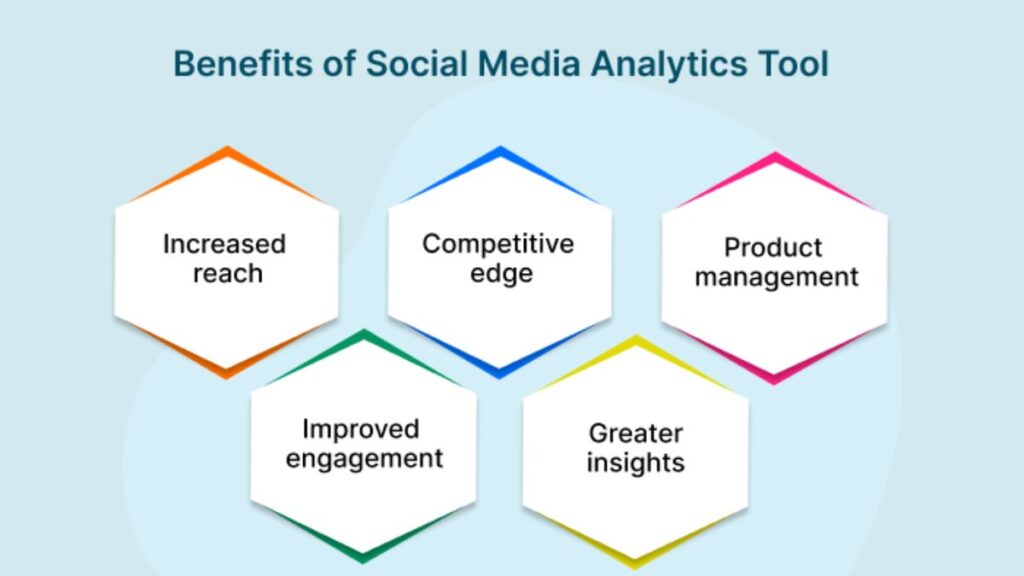In today’s digital landscape, social media has become one of the most powerful tools for marketing, brand building, customer engagement, and communication. With millions of users across different platforms like Facebook, Instagram, Twitter, LinkedIn, and TikTok, businesses and organizations are constantly striving to better understand their audience and optimize their strategies. This is where Social Media Analytics Tools come into play. These tools provide in-depth insights into social media activity, helping businesses track their performance, improve content, and ultimately achieve their goals. However, despite their potential advantages, they come with their own set of challenges. This article explores both the benefits and challenges associated with Social Media Analytics Tools.
What Are Social Media Analytics Tools?
Social Media Analytics Tools are software platforms or applications designed to monitor and analyze social media activity. These tools gather data from social media platforms and convert it into actionable insights. Marketers and businesses use these tools to track various metrics like engagement rates, audience demographics, reach, impressions, and brand sentiment. The data is usually presented in the form of dashboards, graphs, or reports to help users interpret performance trends and make informed decisions. Popular tools in this category include Hootsuite, Sprout Social, Buffer, Google Analytics (for social media traffic), and brand-specific platforms offered by networks like Facebook Insights or Twitter Analytics.
The Benefits of Social Media Analytics Tools
- Better Understanding of Audience Behavior
One of the primary advantages of using Social Media Analytics Tools is the ability to gain a deeper understanding of your audience. These tools provide valuable insights into who your audience is, including their demographics, interests, behaviors, and preferences. By monitoring the type of content that resonates most with followers and tracking engagement metrics, businesses can adjust their strategies to cater to the needs of their audience. For instance, if analytics reveal that younger audiences engage more with video content than with written posts, a business can adapt its social media approach to include more video-focused campaigns.
- Data-Driven Decision Making
Social Media Analytics Tools enable businesses to make decisions based on hard data rather than assumptions or guesses. The tools provide concrete information about which posts generate the most engagement, which times are ideal for posting, and which hashtags work best. This leads to a more efficient social media strategy, as decisions are backed by factual insights. By analyzing the performance of previous campaigns, businesses can tweak their future efforts for better outcomes. Over time, these small adjustments accumulate to produce significant improvements in reach and engagement.
- Improved Content Strategy
A key part of social media success is creating content that resonates with your audience. Social media analytics tools give marketers the ability to track which types of posts—such as images, infographics, blog links, or videos—perform best with their audience. By continuously analyzing which content types generate the highest levels of engagement, businesses can refine their content strategy to ensure that they are producing content that meets the needs and interests of their audience. This allows for a more tailored and efficient content creation process, reducing time and resources spent on strategies that don’t work.
- Enhanced ROI Tracking
Another significant benefit of social media analytics tools is the ability to measure the return on investment (ROI) of social media campaigns. Marketers can track key performance indicators (KPIs) like conversions, lead generation, and sales that result from social media activities. By linking social media campaigns with ROI metrics, businesses can directly measure the financial impact of their online marketing efforts. This level of analysis ensures that marketing budgets are allocated efficiently, and businesses can focus on strategies that bring the highest returns.
- Competitor Analysis
Social media analytics tools also enable businesses to monitor their competitors. By comparing your brand’s performance to that of other industry players, you can identify trends, benchmarks, and areas of improvement. For example, if a competitor’s post is generating significantly more engagement, you can analyze their content and strategy to understand what is working. By using competitive insights, businesses can stay ahead of industry trends, optimize their own strategies, and learn from the successes or failures of others.
- Customer Sentiment and Feedback Analysis
Understanding customer sentiment is another powerful feature of social media analytics tools. These tools can help businesses monitor mentions of their brand, products, or services on social media platforms. By analyzing the tone and context of these mentions, businesses can gauge customer sentiment (positive, negative, or neutral). This feedback is invaluable for improving customer service, addressing concerns, and fine-tuning products or services. Moreover, this feature allows businesses to manage their online reputation proactively, ensuring that any negative sentiment is addressed promptly before it escalates.
- Time and Cost Efficiency
Manual monitoring of social media data can be time-consuming and prone to human error. Social media analytics tools automate this process, saving businesses valuable time and resources. Rather than spending hours tracking engagement metrics manually, businesses can rely on these tools to provide real-time updates and easy-to-read reports. This allows marketing teams to focus on strategy, content creation, and engagement rather than labor-intensive data collection.
The Challenges of Social Media Analytics Tools
While Social Media Analytics Tools offer numerous benefits, they are not without their challenges. Understanding these obstacles is crucial for businesses looking to maximize the potential of these tools.
- Data Overload
One of the most common challenges of using social media analytics tools is data overload. With so many metrics available—likes, shares, comments, followers, reach, impressions, sentiment, and more—it can become overwhelming to sift through all the information and determine what is truly valuable. For businesses that are not familiar with data analysis, interpreting and making sense of all the raw data can be difficult. In some cases, users may focus on vanity metrics like the number of followers or likes without understanding how those numbers contribute to their overall business goals.
- Integration Issues
Many businesses use multiple social media platforms, and integrating data from all these platforms into a single cohesive analysis can be challenging. Some analytics tools struggle to pull data from every platform seamlessly, leading to inconsistent or incomplete data. For instance, a tool may integrate well with Facebook but have difficulty pulling accurate data from newer platforms like TikTok or Snapchat. These integration issues can lead to incomplete reports and missed opportunities to optimize performance across all channels.
- Cost of Advanced Tools
While there are free and basic social media analytics tools available, many of the most advanced and feature-rich tools come at a significant cost. Small and medium-sized businesses may find it difficult to justify the high price tag associated with premium tools, especially if they are just starting to explore social media marketing. In such cases, businesses may have to choose between using a more affordable tool with limited capabilities or investing in a more expensive solution with the potential for greater insights.
- Changing Social Media Algorithms
Social media platforms constantly update and tweak their algorithms. These changes can have a significant impact on the effectiveness of social media campaigns. For example, a platform might change how it calculates engagement, which could lead to discrepancies in analytics over time. Social media analytics tools rely on the data available from these platforms, so if the algorithms change frequently, businesses may see inconsistent data. It’s essential for businesses to stay on top of these changes to ensure their analytics remain accurate and actionable.
- Privacy and Data Security Concerns
With the growing focus on data privacy, businesses must be cautious when using social media analytics tools. Many of these tools require access to personal data or interactions on social media, which raises concerns about user privacy and data security. Additionally, some social media platforms have strict regulations on how data can be accessed or used, making it crucial for businesses to ensure that they are in compliance with all relevant laws and guidelines. Failure to do so can result in legal issues and damage to a company’s reputation.
- Learning Curve
Although social media analytics tools can provide powerful insights, they often come with a steep learning curve. For businesses unfamiliar with the complexities of social media metrics and data analysis, it can take time to get used to the features and functionalities of these tools. This may require training and ongoing education to fully utilize the software. Without the necessary expertise, businesses may struggle to get the most out of their analytics tools, limiting their effectiveness.
- Inconsistent Results Across Platforms
Finally, social media analytics tools often provide different results depending on the platform. For example, a tool that works well for analyzing Instagram data may not provide the same level of insight for Facebook or Twitter. Each social media platform has its unique metrics and data types, which can make it difficult to get a unified view of a brand’s social media performance. Businesses may need to use different tools for each platform, which can increase the complexity of social media reporting and analysis.
Conclusion
Social Media Analytics Tools offer businesses an invaluable resource for understanding their audience, refining their strategies, and improving ROI. With the ability to track performance, analyze customer sentiment, and gain insights into content effectiveness, these tools provide businesses with the necessary data to make informed decisions and stay competitive in a crowded digital marketplace.
However, these tools come with their own set of challenges, including data overload, integration issues, costs, and concerns related to privacy and security. Despite these obstacles, businesses that can navigate these challenges will likely reap significant rewards in terms of enhanced brand awareness, better customer engagement, and improved overall marketing performance.
Ultimately, the key to success lies in selecting the right analytics tools for your business, understanding how to interpret the data, and continuously refining your social media strategy based on actionable insights. By doing so, you can leverage the power of social media analytics to drive meaningful growth and success for your brand.



